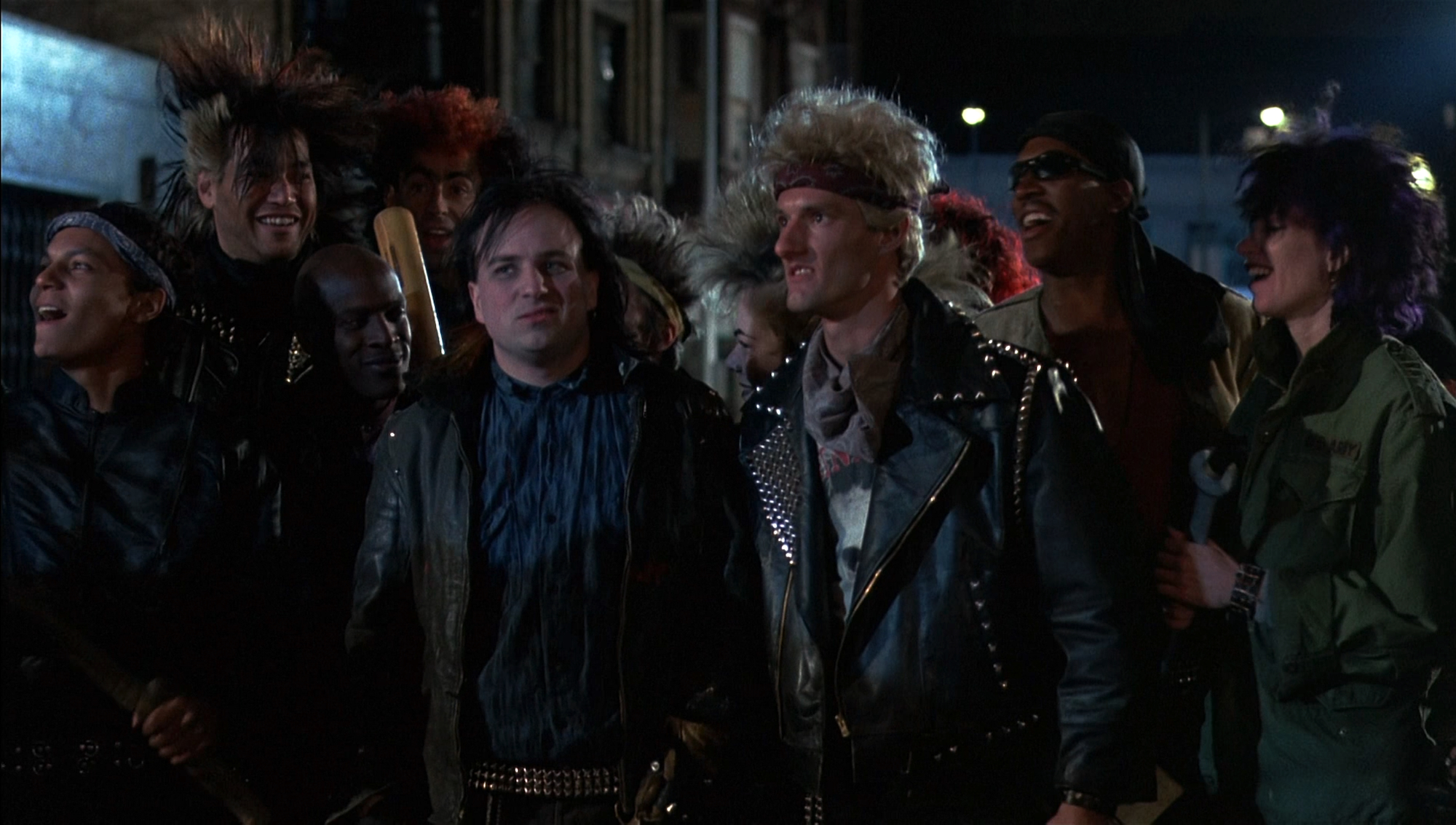“This place feels like it’s from Indiana Jones,” says a young woman as she passes by the imposing, Tetris-reminiscent ruins of the Old Los Angeles Zoo in Griffith Park.
She’s right.
Only in L.A. could craftspeople construct functioning concrete animal habitats with so much artistry that we’re able to imagine the intrepid fedora-wearing archaeologist whipping his way around the jagged and protruding rock formations cascading down the hillside.
And while Indy never actually graced these man-made caves and grottos, another film strangely stands out due to the varying degrees of graffiti that adorn some of the location’s stone walls, jutting boulders, and iron bars. In some ways, things haven’t changed from the time when the Old Zoo was transformed into the secret hideout of a punk gang hellbent on controlling the city streets in Police Academy 2: Their First Assignment (1985).
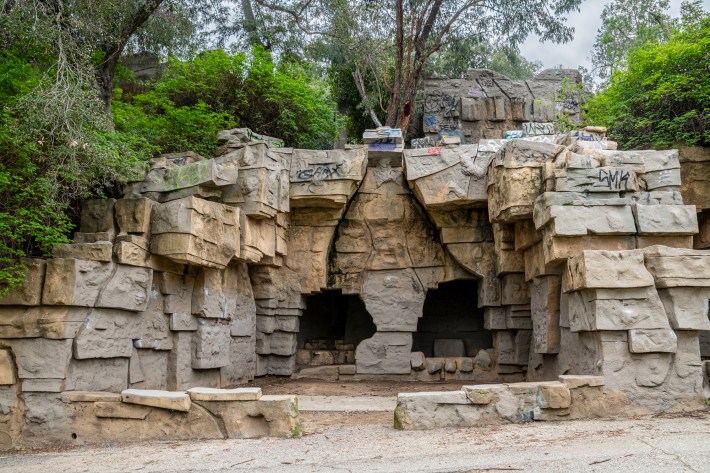
The first Police Academy (1984) film was a surprise hit at the box office, taking in over $81 million off an estimated $4.8 million budget. It was the sixth highest grossing film of 1984, just a few spots down the list from Indiana Jones and the Temple of Doom (1984). It spawned six sequels and an animated series, which in turn inspired action figures and a six-issue set of comics released by Marvel.
The first of its sequels brought back Steve Guttenberg as Cary Mahoney, the charismatic prankster and unofficial leader of a motley group of police cadets that would make any anti-DEI, authoritarian numbskull shit a brick. Returning from the first Academy film were Hightower (Bubba Smith), Tackleberry (David Graf), Jones (Michael Winslow), Hooks (Marion Ramsey), and Fackler (Bruce Mahler). In part two, they are all recruited by the 16th Precinct to help put a stop to the Scullions, a formidable street gang that’s terrorizing the neighborhood and its residents.
Police Academy 2 also had a successful run at the box office after its release on March 29, 1985. It introduced audiences to characters that would continue through at least the next couple of installments: Zed (Bobcat Goldthwait), the sociopathic, emotionally sensitive leader of the Scullions (and later-turned-cop), Mr. Sweetchuck (Tim Kazurinsky), the nebbish, neighborhood lighting store owner (and later-turned-cop), Proctor (Lance Kinsey), the dim-witted accomplice of authority, and the punchiest of all-American families, the Kirklands.
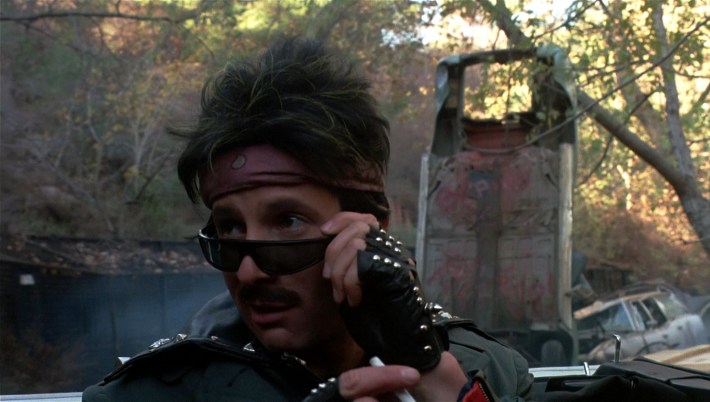
Aside from the officers’ Assignment Miami Beach (part five) and Mission to Moscow (part 7), the city that the Metropolitan Police Department protects is nameless, in a seeming effort to focus on the comedy, rather than dictate that the film is set in any one actual place.
The first film in the series was shot in Toronto, as were parts three and four.
Producer Paul Maslansky, who developed the initial premise for Police Academy and oversaw all seven films, told the Associated Press in 1985, “We shot the first one in Canada, taking advantage of the exchange rate.”
However, when it came to shooting part two, Maslansky, who passed away last year, recognized that it required an altogether different location for “their first assignment.”
Upon returning to Toronto to shoot Police Academy 3: Back in Training, the producer told the Toronto Star, “The second film was filmed in California because it was urban, ghetto-like, and that doesn’t exist in Toronto.”
Ultimately, when you look closer at Police Academy 2 it’s clear that the Metropolitan Police are patrolling parts of Los Angeles.
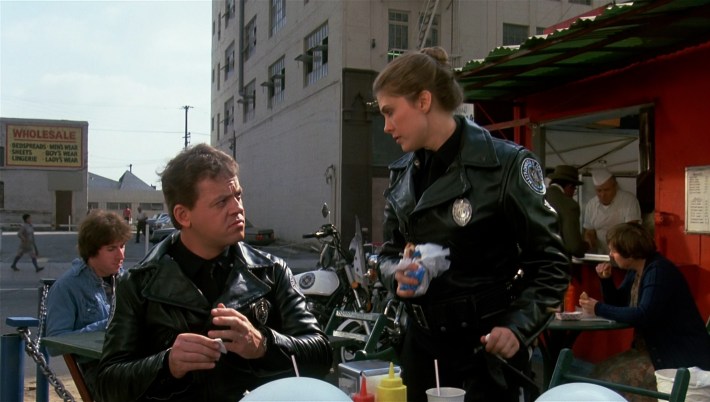
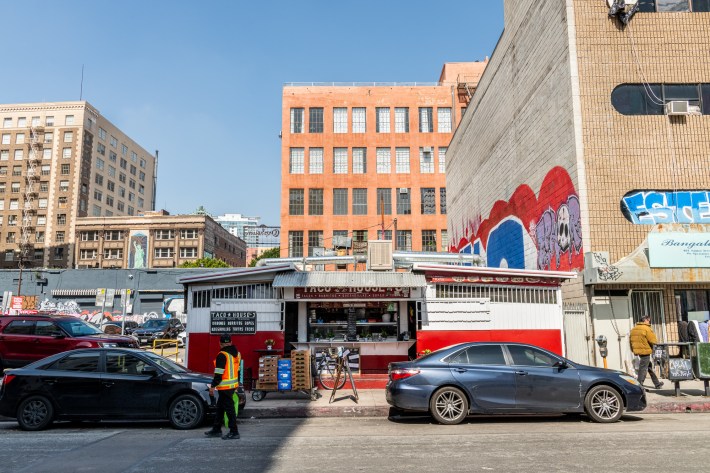
We first see Mahoney driving a quad on Zuma Beach in Malibu. (We could spot those cliffs from anywhere). Maps on the walls of the police precinct show the San Fernando Valley and other areas around the city. The grocery store that the Scullions trash - a Mayfair market that is today a Gelson’s at Franklin Avenue and Bronson Avenue in Hollywood - has showbiz-themed illustrations adorning the walls, including an image of the Chinese Theatre.
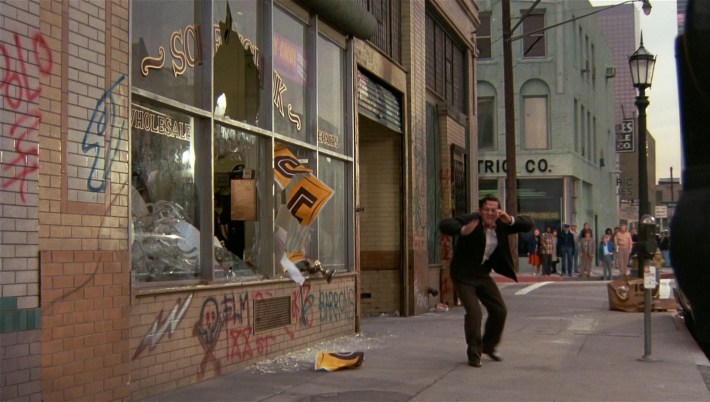
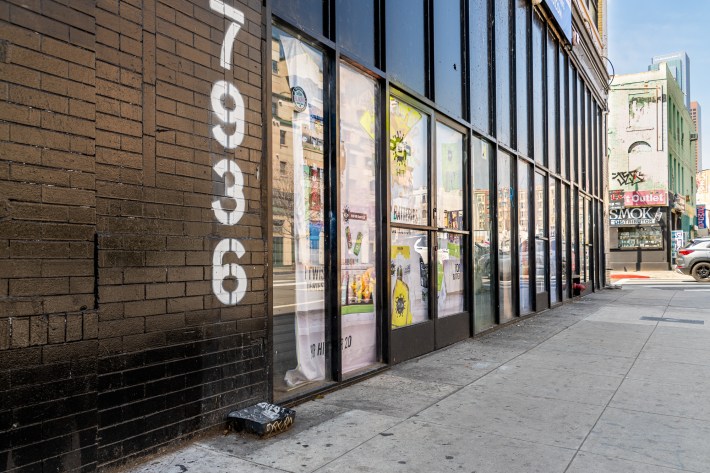
A large portion of Police Academy 2 was filmed in and around the Toy District, as well as bits of Skid Row and the Fashion District. In fact, many of the storefronts, alleyways and streets are so close to one another that the area seems like it was the production’s private backlot, the anchor being Fire Station No. 23. The decommissioned firehouse that is on the National Register of Historic Places was built in 1910 on 5th Street, just east of Los Angeles Street; it closed in 1960. One year prior to Police Academy 2, the station’s interior was famously used as the oh-so-iconic New York headquarters of the Ghostbusters. Other films, including Big Trouble in Little China (1986), Set It Off (1996) and Lost Highway (1997), also made use of the firehouse interior. Police Academy 2 utilized the rear entrance of the firehouse on Winston Street, which plays as the exterior of the 16th Precinct.
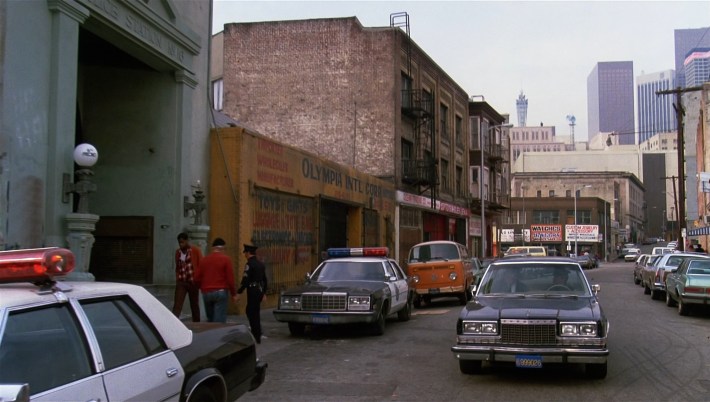
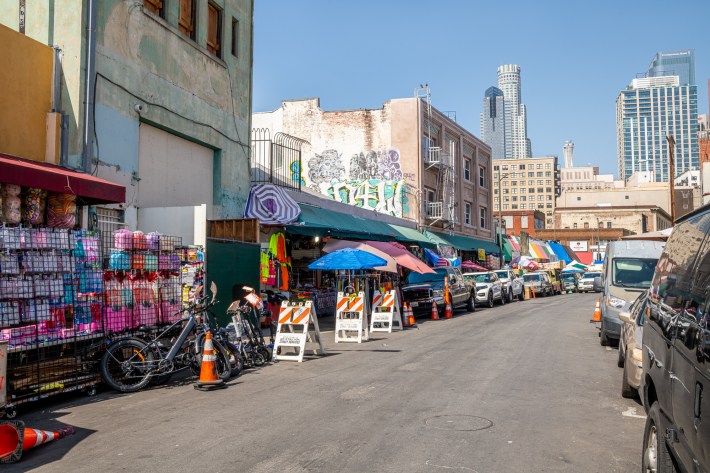
But it’s the Old Zoo in Griffith Park that is arguably the standout location, providing a stark visual contrast to the rest of the film.
When Lieutenant Mauser - played by Art Metrano in one of the film’s noteworthy performances - is promoted to captain of the precinct, he indefinitely suspends Mahoney over a classic Police Academy prank that involves gluing the newly-instated captain’s hands to his head while showering. Mahoney, his partner Vinnie Schtulman (Peter Van Norden), who’s a glutton for unsanitary eating habits, and the recently resigned Captain Pete Lassard (Howard Hessman), take on a self-assigned and unsanctioned sting operation to find the leader of the Scullions. Mahoney goes undercover as Jughead, who runs with a gang called - what else? - the Archies. Eventually, Mahoney is taken to meet Zed at the gang’s hideout at the Old Zoo.
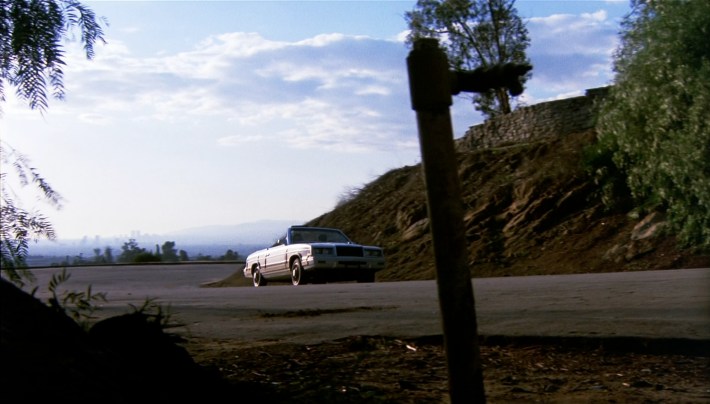
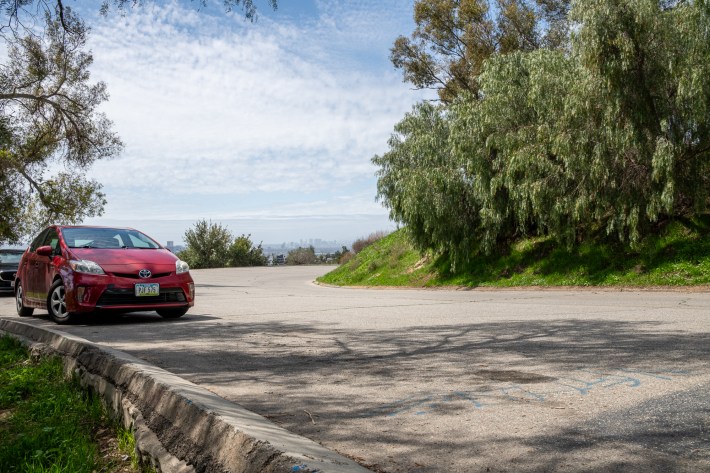
Police Academy 2 location manager Kenneth Fix told L.A. TACO, in a recent interview at his home, that the Old Zoo wasn’t initially on the radar of the film’s higher-ups.
“They didn’t think that the hideout that they were trying to create was working,” says Fix. “We’d looked at a few places that they didn’t really like, because they didn’t provide a broad enough canvas.”
But Fix, who says he based his locations-work on finding places that had never or rarely been filmed, had something up his sleeve as soon as he heard the word hideout.
“I said, ‘Why don’t we go look at the Old Zoo?’ Somebody said, ‘What the hell is the old zoo?,’” Fix recalls, laughing.
This was about twenty-five years before the Independent Shakespeare Co. started performing on the Old Zoo’s sloping, amphitheater-like lawn, or farm tractors pulled wagons of willing thrill-seekers through the grounds during October’s Haunted Hayride.
“It wasn’t popular at the time,” says Fix of the location. “I mean, I had gone there and wandered around in it once or twice before, because I thought it was a really interesting place.”
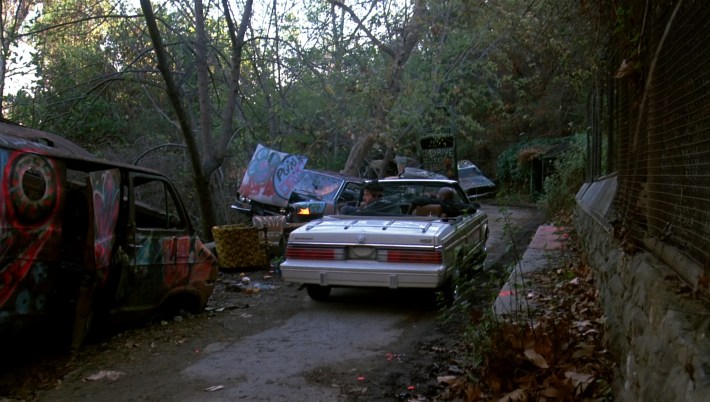
Screenshot via Warner Bros.
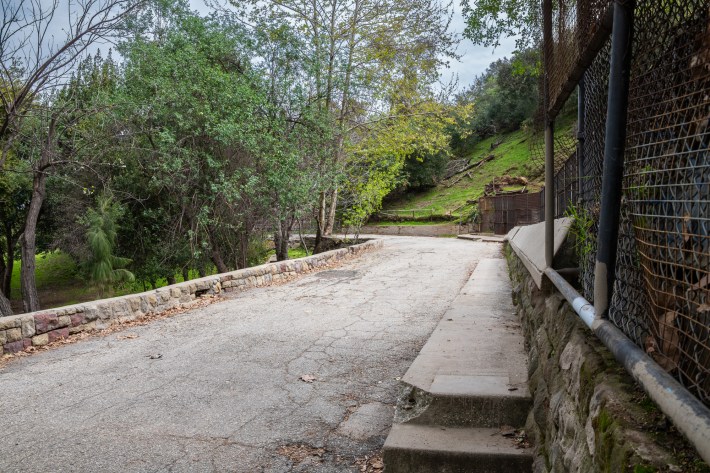
The Old Zoo opened in 1912 and closed to the public on August 16, 1966; the current L.A. Zoo opened on November 28, 1966. For a couple of years after the closure of the Old Zoo, its facilities were still in use as a holding area for the transferring of animals to and from other zoos, keeping animals separated or to house sick ones.
By the early 1970s, the Old Zoo was fenced off and completely abandoned. The Los Angeles Times reported that people would sometimes scale the fences to find “a ghostly animal kingdom.” Park redevelopment plans from the late 1970s intended for the reopening of the Old Zoo for public use. By the mid-‘80s, renovations that included the removal of a seal pond, elephant house, and monkey cages were underway. Parts of the grounds reopened to the public in early 1987.
The man-made grottos at the Old Zoo have long-held a mysterious air about them, attracting Angelenos, tourists, and urban explorers alike. They were built as additional animal habitats in the 1930s by County Relief crews and the Works Progress Administration, programs that were founded during the Great Depression to assist unemployed individuals by providing jobs on public works projects.
The aesthetic is part archaeological dig, part German Expressionism. They were later left in place, because, in part, it proved less expensive than tearing them down.
The fabricated grottos housed various species of bears, including a polar bear named Ivan the Terrible who, in 1963, killed his mate. Today, visitors to the Old Zoo can walk into the enclosures, but as seen in Police Academy 2 and a blueprint elevation plan, they were designed with 15-foot-deep gutters and moats, which were later filled in with dirt.
“I think they did that because there were too many places for people to get hurt or killed,” says Fix.
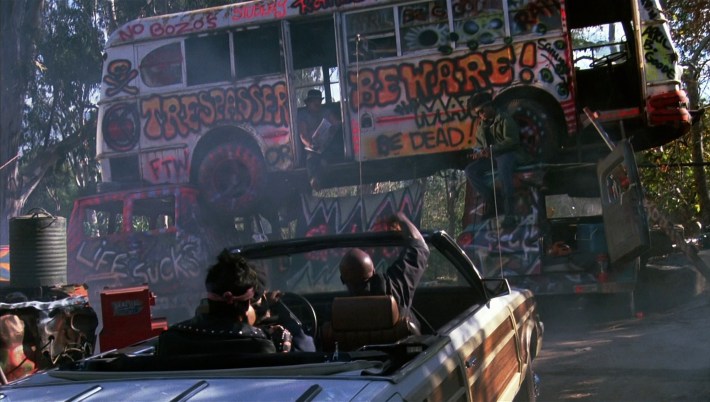
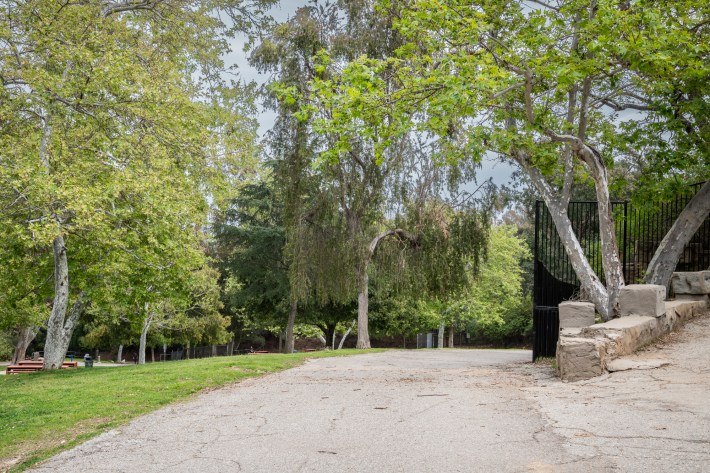
While Police Academy 2 is arguably the most notable film of the blockbuster era to first shoot at the Old Zoo, it had been filmed before.
Movies from the late ‘40s and early ‘50s, including Kiss the Blood Off My Hands (1948) starring Burt Lancaster and The Star (1952) with Bette Davis, feature shots of the Old Zoo in full function. Ivan the polar bear makes a cameo appearance in It’s a Bikini World (1967), before the animals were moved to the current zoo.
In Flareup (1969), Raquel Welch is stalked at night through the grounds of the Old Zoo by a menacing lunatic. B-pictures like Crazy Mama (1975), directed by Jonathan Demme, and Dracula’s Dog (1977), are filmic records of how completely overgrown and unkempt the area was in the 1970s. Police procedurals including Starsky and Hutch, Barnaby Jones, CHiPs and T.J. Hooker all used the Old Zoo. One of the grottos was featured as the otherworldly facade of an alien race’s Earth-based lair in a 1977 episode of Wonder Woman.

Regardless of the Old Zoo’s onscreen history, however, it ultimately took some convincing to get the decision-makers of Police Academy 2 to look at the location.
“They just couldn’t get the concept of an old zoo. It’s the word zoo. They just couldn’t understand,” says Fix.
But once they scouted it, they were sold.
“Everybody freaked out, because it had so many different levels and different looks,” says Fix. “They could do anything they wanted to, basically.”
Fix tells us that the producers of Police Academy 2 were so enthusiastic about the Old Zoo that more action was written to take place there, with pages of the script revised to reflect the location.
When Mahoney first arrives at the hideout, he inquires about it. One of the Scullians says, “This used to be where they kept the bears, my man.”
At one point, another gang member accidentally lets slip the whereabouts of the secret lair. Mahoney then says into his hidden wire, “The old zoo! The oooold zoo. Not the new zoo, but the old zoo.”
When Lassard, who’s listening in via a handheld radio, repeats the name of the location, Schtulman says, “The old zoo? I never even saw the new zoo.”
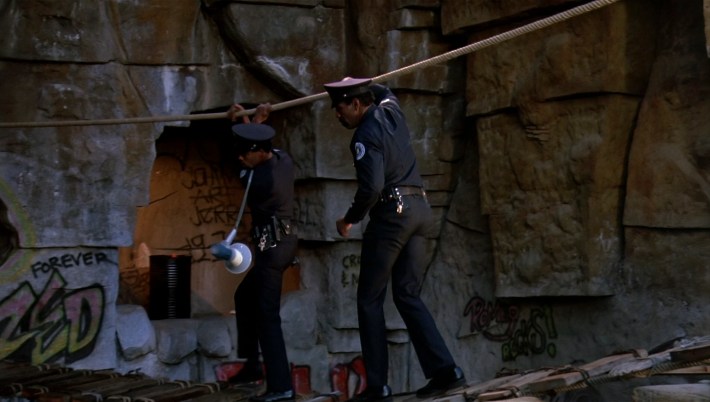
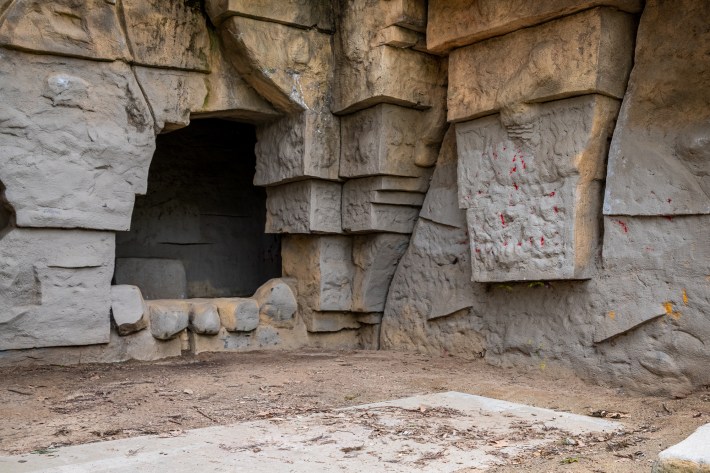
With the exception of minimal costs for city employees to monitor filming, Fix recalls not having to pay any usage fee for the Old Zoo, which presumably added to the appeal of filming there.
Maslansky also told the Associated Press at the time, “Shooting in Los Angeles is expensive. Not because of the city officials; they provide every cooperation. It’s the merchants and the property owners who can really hit you. There’s so much filming going on that they ask a lot of money for location sites, parking, etc.”
The current rate sheet for filming in Griffith Park shows a base cost of $450 per day of filming, which includes base camp and crew parking.
What separates the appearance of the Old Zoo in Police Academy 2 from every other film or TV show that shot there, prior or subsequent to, is the implemented design. A rope bridge suspended over a filthy, rat-infested moat, burnt-out cars, torn-up furniture, and a haphazardly-constructed portcullis made of graffiti-clad vans, a passenger bus, and a car hood all make for a visually dynamic gang hideout.
“There was no problem doing anything there,” says Fix, “because the place was basically abandoned.
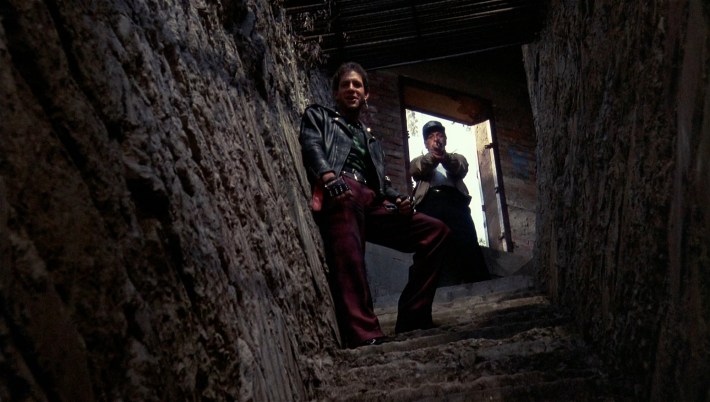
Screenshot via Warner Bros.
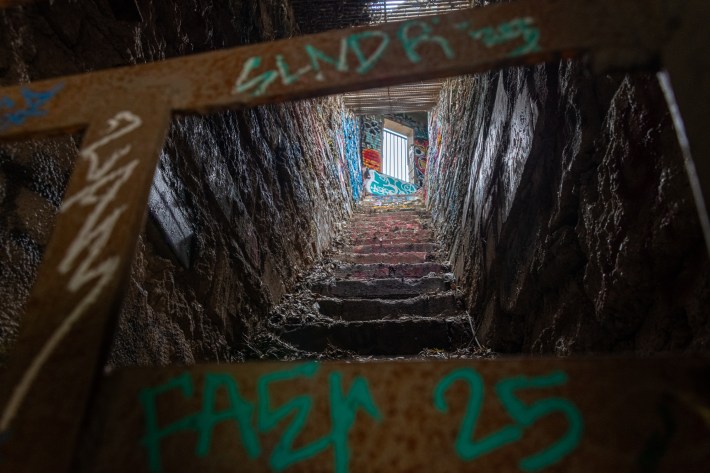
Years later, when Fix attended a production of Shakespeare in the park at the Old Zoo, he says he thought back to Police Academy 2.
“It was such a big deal,” says Fix. “It wasn’t just like taking a couple of days and shooting a shot or two. I mean, we really went in there and did some work, changed things, moved things. We were there for quite awhile.”
He’s confident that the use of the Old Zoo in Police Academy 2 inspired other films to shoot there.
Among films that later utilized the location are Eraser (1996) with Arnold Schwarzenegger, which used it as the “New York City Zoo,” and Anchorman: The Legend of Ron Burgundy (2004), in which it doubled for the San Diego Zoo. Under the Silver Lake (2018), the enigmatic L.A. noir starring Andrew Garfield, turned it into a slightly altered version of itself.
Fix says, “There isn’t anything else anywhere in L.A. that looks even close to the Old Zoo.”
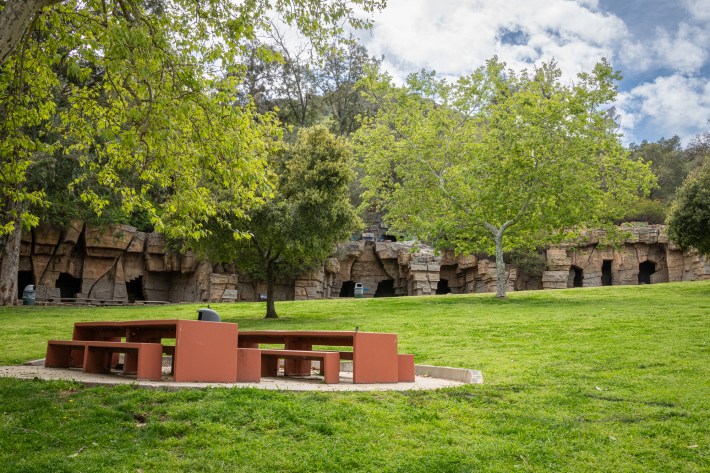
Police Academy 2: Their First Assignment has a 32% rating on Rotten Tomatoes. Critics felt it was anything but Shakespeare in the park.
Gene Siskel said at the time of the film’s release, “It has two more laughs in it than the first picture, which means it has a total of two laughs in it.” Fellow critic Leonard Maltin gave it a BOMB rating and wrote, “There are Dragnet episodes with more laughs than this movie.”
Fix, who later made a career location managing blockbuster sci-fi/action films like Stargate (1994), Independence Day (1996), Godzilla (1998), and The Day After Tomorrow (2004), has no qualms.
He says, “It’s all work. There isn’t anything silly or there isn’t anything stupid. I approached it as my life’s work and it was. It was important, even Police Academy 2.”
The Police Academy films aren’t typically cited as examples of cinematic excellence (not that it matters), but the second film in the series is somewhat of an anomaly in terms of visual character.
Though Police Academy 6: City Under Siege (1989) was also shot in L.A., it relied heavily on studio backlots. Police Academy 2: Their First Assignment, on the other hand, has a raw, textural quality that is uncharacteristic of the rest of the films, because it was largely shot on the incomparable streets of L.A. and the grounds of an old zoo that ignites the moviegoing imagination.
Follow Jared on Instagram at @jaredcowan.
